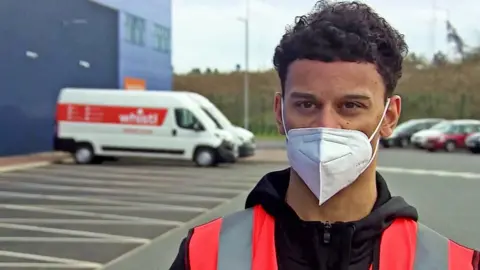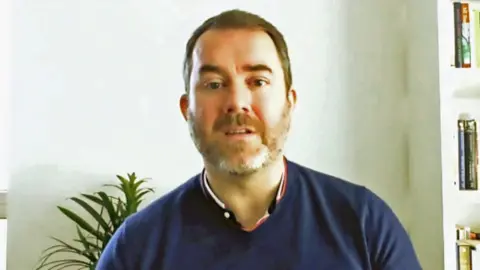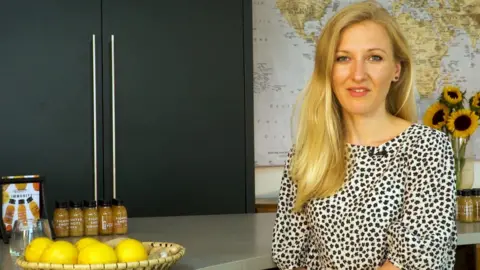Kickstart: Most job roles for youths not yet filled
Fewer than 2,000 young people have so far started new roles under the government's £2bn Kickstart jobs scheme, data shows.
The programme, which launched in September, has created 120,000 temporary jobs to date.
Chancellor Rishi Sunak told the BBC coronavirus restrictions were making it harder for more young people to get started.
However, he expected the number to rise once restrictions are lifted.
"Obviously because of the lockdowns and restrictions, that hampers businesses' ability to bring people into work," said Mr Sunak,
"What we can look forward to, as the restrictions ease, is more of these young people starting those placements.
"But taking a step back, we announced this scheme first week of July, it went live the first week of September and here we are, just a few months later, with 120,000 jobs having being vetted, funded and created."
The Chancellor insisted that the government had moved at an "enormous pace" to set up the programme, which targets youths at risk of long-term unemployment.
"I've always said my priority through this crisis is to protect, support and create as many jobs as possible, and young people in particular have been at the forefront of my mind," said Mr Sunak.
"We know that they're most likely to work in affected sectors, they're twice as likely to be furloughed, and the ones leaving college are entering a really difficult labour market."
Youth unemployment rose to 14.5% between August to October 2020, with 597,000 people aged 16 to 24 unemployed, up from 11% in the same period in 2019.
Latest data from the Department of Work Pensions shows that as of 15 January, 1,868 young people had begun their placements.

Hayden Finlayson, 24, is one of them. He was made redundant from a retail job last summer.
Looking for work during the pandemic proved difficult: "You start thinking about things - whether you're going to find work again."
He has secured a Kickstart placement at a Whistl distribution centre in Bedford, an opportunity for which he is grateful.
"I gave it a go. It's a new experience and I want to do new things," he said. "[I'm learning] different skills every day, things I've never done before."
How it works
Businesses apply to the Department for Work and Pensions (DWP) to create Kickstart places, which are then vetted for suitability.
Young people aged between 16 and 24 who are on Universal Credit are matched to roles by their job centre work coaches.
They are then interviewed by the prospective employer, which decides whether to take them on.
For each successful placement, the government covers the National Minimum Wage for a six-month period, at 25 hours per week.
A further £1,500 grant is available per placement to help cover setup costs and assist in the development of employability skills. The current £2bn budget allows for around 250,000 roles.

Following criticism from small businesses, firms who wish to create just a handful of roles will have the option of applying direct to the Department for Work and Pensions.
Previously, small firms who wanted to create fewer than 30 Kickstart jobs had to group together, or use a "gateway" provider as an intermediary.
More than 600 gateways have now been approved, but small businesses complained that they found the process slow and difficult.
"The decision should have been made in September," said Craig Beaumont, chief of external affairs at the Federation of Small Businesses (FSB).
"There is now a backlog of cases of people who've been appointed through intermediaries, who've not been able to access that work yet. So we need a real focus from the government to clear that."
Asked if the scheme would need extending because continuing restrictions could prevent its aims being achieved this year, Mr Sunak left the possibility open.
Anna Szymanowska runs Fighter Shots, which makes ginger-based remedy drinks. She is keen to create three digital marketing Kickstart roles as soon as possible.
However, she says her application - which was done in a pool with other businesses - took a long time.
 Fightershots
Fightershots "It was a little bit lengthy, because the first time I heard of the scheme was July or August," she told the BBC.
"We applied within a month [of hearing about it], and just yesterday we received a contract to sign. So it was lengthy but otherwise well managed."
The Chancellor told the BBC that the changes hadn't been made earlier because Kickstart had been set up "at speed". He pointed out other interventions aimed at supporting young people's jobs, including investment in employment support schemes, training and apprenticeships.
Tracy Fishwick is the managing director of Transform Lives Company, a social enterprise which helps people into work.
She believes that the young people chosen to have Kickstart placements will be very important.
"The young people who really probably would already get a job with a little bit of help - we don't want all the Kickstart jobs going to those young people," said Ms Fishwick, who previously worked with the Future Jobs Fund - a scheme for young people created by Labour in 2009.
"We need to be able to put things in place to support those young people who were already unemployed before Covid."
